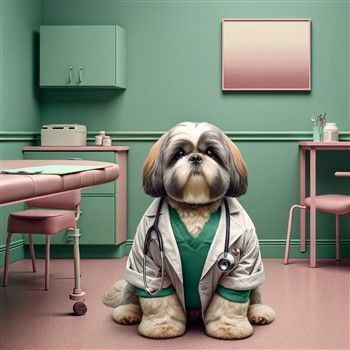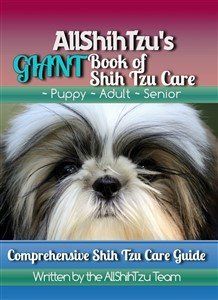Shih Tzu Health: General Health & Serious Issues

Overview
The Shih Tzu generally enjoys good health, but as a brachycephalic breed, they are more susceptible to certain respiratory conditions and diseases. This article delves into the overall health of the Shih Tzu, offers essential care tips, and highlights prevalent health concerns that owners should monitor.
Identifying Health Status in Shih Tzu Dogs: Key Signs to Observe
Signs of a Healthy Shih Tzu:
A healthy Shih Tzu typically exhibits a vibrant and playful demeanor. Key indicators include a glossy, well-maintained coat free from excessive shedding or bald spots, clear and bright eyes, and clean ears without any discharge or foul odor. Their breathing should be regular without any wheezing or excessive panting, especially at rest. A healthy appetite and regular bowel movements are also vital signs. Consistent energy levels and a willingness to engage in play or daily walks further reflect their good health. Additionally, a Shih Tzu should maintain an appropriate weight for their size and age, neither underweight nor overweight.
Signs of Health Issues in a Shih Tzu:
Conversely, a Shih Tzu showing signs of health problems might display a range of symptoms. These can include a dull or matted coat, red or weepy eyes, or frequent scratching at the ears indicating potential infections. Noticeable changes in breathing patterns, such as labored breathing or chronic snoring, are particularly concerning in this brachycephalic breed.
A loss of appetite, irregular bowel movements, or drastic changes in weight should prompt a veterinary check-up. Lethargy, reluctance to play, or a general decrease in activity levels can also signal underlying health issues. It's crucial to be attentive to any unusual behaviors or physical changes, as early detection can significantly impact the effectiveness of treatment.
Tips for Keeping a Shih Tzu Healthy
Consistent Exercise:
Regular physical activity is crucial for Shih Tzu dogs to maintain a healthy weight and promote good joint health. Due to their small size, even short walks can be effective. Engaging them in light play indoors, like fetch or hide-and-seek with toys, can also provide mental stimulation and physical exercise. It's important to avoid overexertion, especially in hot weather, due to their susceptibility to breathing issues.
Read more about: Shih Tzu Exercise.
Nutritious Diet: A balanced diet is essential to good health. Shih Tzu dogs can have sensitive stomachs, so high-quality food that's easy to digest is preferable. And you'll want to avoid additives such as chemical preservatives, coloring or flavoring. Some Shih Tzu dogs may require special diets due to health conditions like allergies or dental issues.
Read more about: Shih Tzu Feeding Guidelines.
Grooming Routine: Regular grooming is vital for good skin and coat hygiene. Daily brushing prevents matting and removes debris. Bathing a Shih Tzu every three keeps their skin healthy and coat shiny. Ear cleaning should be part of the routine to prevent infections, and nail trimming is necessary to avoid overgrowth and walking difficulties.
Read more about: Shih Tzu Grooming.
Know about Preventable Issues: Read our guide that focuses on 5 issues veterinarians see repeatedly in this breed: corneal injuries, dental disease, osteoarthritis, ear infections, and skin allergies. For each one you will find stats backed by current data, along with clear, practical steps to reduce risk and improve comfort.
Oral Health Care: Dental health is a major concern for the Shih Tzu breed. Daily brushing with a dog-specific toothbrush and toothpaste can significantly reduce the risk of periodontal disease. Regular dental check-ups and professional cleanings by a veterinarian are recommended to maintain oral health and prevent tooth loss.
Read more about: Shih Tzu Dental Care.
Eye Maintenance: Due to their prominent eyes, Shih Tzus are prone to eye issues. Daily wiping of the area around the eyes with a soft, damp cloth can prevent staining and infection. Regular veterinary eye exams help in early detection of common eye problems.
Read more about: Shih Tzu Eye Care.
Mental Well-being: Mental health is as crucial as physical health. Providing a stable environment, regular socialization, and consistent training from a young age helps in developing a well-adjusted temperament. Interactive toys and games that challenge a Shih Tzu's intelligence are beneficial for their mental stimulation.
Read about more: The Best Toys for a Shih Tzu for top recommendations for both puppies and adults.
Veterinary Check-ups: Regular check-ups, at least once a year, are crucial for early detection of potential health issues. Vaccinations, flea and tick prevention, and routine blood tests are part of these visits. Discussing any changes in behavior or health with the vet during these visits is important for proactive care.

Common Health Issues in Shih Tzu Dogs
Allergies
Shih Tzu dogs can develop allergies to food, fleas, and environmental factors, leading to itchy skin, ear infections, and gastrointestinal upset. Identifying the allergen can be challenging and may require veterinary assistance. Treatment involves avoiding the allergen, medication to control symptoms, and sometimes dietary changes. Regular flea control and hypoallergenic bedding can help prevent flare-ups.
Read more about: Shih Tzu Allergies.
Brachycephalic Airway Syndrome
The Shih Tzu belongs to the brachycephalic breed group, characterized by their short noses and flat faces. This distinctive anatomy predisposes them to respiratory challenges, including difficulty in breathing, snoring, and susceptibility to heat stress. Awareness of these limitations is crucial, especially during exercise and in hot climates.
To mitigate these issues, pet parents should monitor their Shih Tzu for signs of respiratory distress, such as labored breathing or excessive panting. In severe cases, surgical interventions might be necessary to improve airway function. Ensuring a calm environment and avoiding overexertion are key preventive strategies.
Read more about: Shih Tzu Breathing Issues, which covers brachycephalic airway syndrome, elongated soft palate, stenotic nares, collapsed trachea, reverse sneezing and 'breathe better' tips.
Dental Issues
Due to their small mouths, Shih Tzus often suffer from overcrowded teeth, leading to dental problems like periodontal disease. Symptoms include bad breath, difficulty eating, and tooth loss.
Regular dental check-ups, professional cleanings, and brushing at home are essential. A diet that promotes dental health can also be beneficial.
Read more about: Shih Tzu Dental Issues.
Ear Infections
Their floppy drop ears are adorable but can trap moisture and debris, leading to bacterial or yeast infections. Signs include scratching, redness, and odor in the ears. Regular cleaning is crucial in preventing these infections.
If an infection occurs, prompt veterinary treatment is necessary to prevent it from becoming chronic or causing more serious complications. This often involves medicated ear drops and thorough cleaning.
Eye Problems
The Shih Tzu breed is prone to various eye conditions such as cataracts, which cloud the lens and can lead to blindness, and progressive retinal atrophy, a degenerative disease affecting the retina. Dry eye, or keratoconjunctivitis sicca, is another common issue, where inadequate tear production leads to eye irritation and infection.
Regular eye exams are essential for early detection and treatment. Symptoms like cloudiness, excessive tearing, or redness should be promptly addressed with veterinary care. In some cases, surgery or lifelong medications may be necessary.
Read more about: Shih Tzu Eye Issues.
Hip Dysplasia
Hip dysplasia is a genetic condition where the hip joint doesn't fit properly in its socket, leading to arthritis and pain. Though more prevalent in larger breeds, Shih Tzu dogs are not immune. Symptoms include limping, reluctance to exercise, and difficulty in standing up.
Managing hip dysplasia involves maintaining a healthy weight to reduce stress on the joints, providing a comfortable resting area, and using supplements or medications as prescribed by a veterinarian. In advanced cases, surgical options may be considered.
Read more about: Shih Tzu Hip Dysplasia.
Hypothyroidism
Hypothyroidism is a common hormonal issue in with the Shih Tzu, characterized by insufficient thyroid hormone production. Symptoms include weight gain, lethargy, skin issues, and hair loss. It often affects middle-aged dogs and can be mistaken for normal aging.
Treatment involves daily thyroid hormone replacement and regular veterinary monitoring to adjust dosages as needed. With appropriate management, dogs with hypothyroidism can lead healthy lives. Diet and exercise are important for maintaining overall well-being.
Intervertebral Disc Disease (IVD)
Intervertebral Disc Disease (IVD) in Shih Tzus involves disc degeneration in the spine, leading to pain, nerve damage, or paralysis. Symptoms include back pain, stiffness, and mobility issues. It's more common in middle-aged to older dogs.
Treatment ranges from rest and medication for mild cases to surgery for severe conditions. Ongoing physical therapy is important for recovery. Preventive measures include maintaining a healthy weight and regular exercise to support spinal health.
Patellar Luxation
This condition involves the kneecap slipping out of place, causing pain and an abnormal gait. It's a common orthopedic issue in small breeds like the Shih Tzu. Mild cases might show intermittent limping, while severe cases can lead to lameness.
Treatment varies from conservative management with pain relief and physical therapy to surgical intervention in more severe cases. Maintaining an optimal weight and regular exercise can help manage symptoms.
Skin Issues
Canine skin issues present a variety of symptoms and require different forms of treatment. These issues can range from mild, such as itchy skin and rashes, to more severe conditions like hot spots, which manifest as highly irritated and infected areas of skin. Serious ailments include yeast infections, characterized by an overgrowth of fungi on the skin, and eczema, which causes dry, itchy, and inflamed skin. Additionally, dogs can suffer from Pyoderma, a bacterial skin infection, and Sebaceous adenitis, a condition that inflames the skin's sebaceous glands. Each of these conditions demands specific veterinary diagnosis and treatment, highlighting the importance of awareness and care for a dog's skin health.
Read more about: Shih Tzu Skin Problems for details on how to treat itchy skin, rashes and other issues.
Stomach Related Health Issues in Shih Tzu
Constipation
Constipation in Shih Tzu dogs manifests as infrequent or difficult bowel movements, with symptoms like straining, hard stools, or a lack of stool for days. Factors leading to this include low fiber diets, insufficient water, and lack of exercise. It can also be a sign of underlying health issues.
Treatment typically involves dietary changes, such as increased fiber, and ensuring ample water intake. Regular exercise is also beneficial. If these measures do not help, veterinarians may prescribe stool softeners or laxatives. Severe cases, especially those involving obstructions, might need more intensive treatment.
Read more about:
Shih Tzu Constipation for details on home remedies and more.
Diarrhea
Diarrhea presents as loose or watery stools, frequent defecation and changes in stool appearance. Causes range from dietary changes to infections or stress. Acute cases are typically short-lived, while chronic ones may signal deeper health issues.
Treatment for mild diarrhea involves a bland diet and ensuring proper hydration. Probiotics can help restore gut balance. Persistent or severe cases, especially with symptoms like vomiting or lethargy, require veterinary attention. Chronic diarrhea may need medication or special diets and highlights the importance of regular veterinary check-ups for early management.
Read more about: Shih Tzu Diarrhea for details on home remedies and more.
Upset Stomach
Upset stomachs with a Shih Tzu is marked by vomiting, appetite loss, and abdominal discomfort. Common causes include dietary issues, infections, or stress. Occasional mild symptoms are common, but frequent or severe episodes need further examination for underlying causes.
Treatment typically involves a bland diet and ensuring proper hydration. Persistent symptoms or those accompanied by other concerns like diarrhea or lethargy require veterinary attention. Chronic stomach problems may need medical treatment and diet modifications. Regular vet visits are key for early management and diagnosis of more serious conditions.
Read more about: Shih Tzu Upset Stomach.
Do You Have Your Book?
Our book is one of the most comprehensive Shih Tzu care books that exist and is available in both a hardcopy and eBook format. Learn more about AllShihTzu's GIANT Book of Shih Tzu Care.
Related Health Articles:
How to Help a Shih Tzu Live a Long Life - Steps you can start implementing today that will directly affect your sweet Shih Tzu's life span. Most are very easy to work into a pup or dog's typical care routine.
Shih Tzu Colds and Flu - The types of colds and flus a Shih Tzu can catch, signs and symptoms, at-home treatment to help your little guy or gal to feel better, and signs that it's time for a veterinarian checkup.
Top 5 Shih Tzu Licking Hazards - Read about the top 5 things that are incredibly dangerous for a Shih Tzu to lick. These outdoor elements do not need to be ingested; merely licking them is enough to cause serious issues.
Shih Tzu Skin Problems - This article covers the most common skin issues that can be seen with Shih Tzu dogs, including itchy skin and rashes. Includes home remedies with topical products and/or environmental changes, as well as vet treatments.
You May Also Like:
Safe and Soothing Treats for Shih Tzus with Digestive Issues - If your Shih Tzu has a tummy that’s quick to protest, finding the right treat can feel like a guessing game. Thankfully, there are gentle options that dogs find super-delicious. See our list of the best belly-friendly treats.

